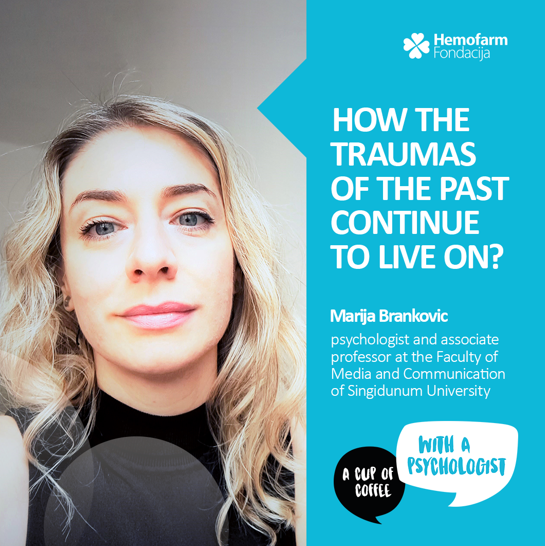
16/06/2022
How the traumas of the past continue to live on
Marija Branković
psychologist, associate professor at the Faculty of Media and Communications, Singidunum University
How the traumas of the past continue to live on
As a child of the 1990s, the war in Ukraine inevitably evoked memories of crises, conflicts, bombings, waves of refugees and a general sense of insecurity. Are we, as a society that has survived everything, become a bit "desensitized" to new traumatic events? Or do we pay a price for it?
Today, when you ask people about the events from the 1990s, they would rather see them stay in the past. But, forgetting is not always the best, neither possible solution. Even if we believe that we have successfully forgotten something, and without actually facing difficult or unfavourable aspects of the experience, we can be sure that maintaining that "forgetting" has its psychological price. According to the fear management theory, many of our actions and beliefs actually have a defensive role, that is, a role to protect us from some unpleasant findings and insight that we are finite beings. People are usually ready to invest a lot in maintenance of their psychological defences, even when it becomes bad for them. Therefore, psychology advocates the importance of insight - when we do not supress difficult experiences, but face them, we open space for ourselves to constructively treat these experiences and increase the freedom to redefine our behaviour.
All this becomes even more complicated when we speak about social trauma. Social traumas also imply the transformation of society itself, social institutions and social narratives. In times of trauma and conflict, these adjustments enable society to somehow justify what is happening and to survive a period of trauma. But that means that a society that survives trauma is an irreversibly changed society. And we as individuals change, as well as our identities, beliefs and perspectives on the world.
What happens most often is that traumatized societies „shut down“ and in this we can recognize also many characteristics of our region. Social psychologist Daniel Bar-Tal coined the term ethos of conflict to denote the series of social beliefs that develop in a conflict situation and that help people survive the conflict and society to mobilize its resources to fight. However, when conflicts end, conflict-specific beliefs are sometimes still maintained, such as uncritically positive attitudes toward one's own group, victimization of one's own group, negative views of other groups, and delegitimization of these groups, and denial of their victims.
Generations growing up after the conflict thus learn to look at the world in which the conflict continues, at least on some symbolic level. Young people adopt an identity that is closed, defined according to the demarcation lines from the conflict and very often essentialized, that is, experienced as something unchangeable and inevitable. Finally, we come to the situation that some social divisions are simply implied, even in the absence of some strong personal intolerance. Loyalty to divisions and conflicts from the past significantly defines both our current and future priorities and limits our ability to develop as a society. To mention one specific example, political life in the countries of the region is organized according to traditional identities, primarily ethnic (perhaps most obviously the case in B&H).This principle prevents or makes it harder to detect alternative basics of political engagement. For example, young people face similar problems, from whatever ethnic group they come from, but lack a shared political identity in order to engage together in political life.
To conclude, we usually do not have the freedom to choose whether we will experience crises and traumas, but we certainly have the opportunity to choose how we will treat them. Just as traumatic social events can lead to the development of a "siege mentality" and the conservativization of society, they can intensify a sense of solidarity and mutual empathy. I do not think that our society became "desensitized" to trauma, but that the process of adaptation to various traumas from the past had its clear prices, social and individual, which the younger generations now continue to pay. Is a different path possible and what would it mean? Attitudes towards the past and traumatic events are key to establishing a constructive social climate. Like individuals who need to integrate their traumatic experience into autobiographical memory in some way, societies also have the opportunity to redefine their values, goals, and identities. Here is a simple initial step: talk to your friends, parents, grandparents, about everything that has happened in our country since the 1990s. And talk to people on the "other side" of the border - I believe we can all learn a lot from that.

AUTHOR
Marija Branković
psychologist, associate professor at the Faculty of Media and Communications, Singidunum University